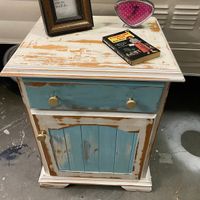Steps
Step 1
Select the right piece of furniture. It needs to be solid timber. It doesn’t matter what colour it is painted, or whether it is varnished or matt, but it does have to be wood. Laminated furniture or anything made from chipboard or MDF is not suitable.
You might have something at home that you love the shape of, but just don’t like the colour or finish. Otherwise, check out opportunity shops or online marketplaces for a bargain. I picked up this bedside table for only $20 and despite looking basic and old, it is a solid piece of furniture. It needed two people to lift it into the car boot!
Before getting started, take off the door and take out the drawer as they will be much easier to work on separately. Also remove any handles, but obviously keep them if they match the style you’re looking for.
 .
.  .
.  .
. 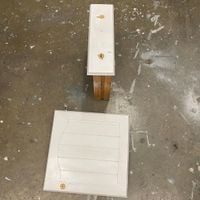
Step 2
Sand off any varnish and get the furniture down to a matt finish so that you can paint over it again. Depending on what colour the furniture is, you may want to sand the whole thing back to bare wood.
For my bedside table, I wanted a finish that mixed wood grains with white and another colour, so I was happy to sand the furniture back to a mixture of white with wood. If the furniture had been a different colour or simply varnished, then I may have sanded the whole thing back to bare wood and started again with a full coat of white paint.
For this project you can sand by hand, but it’s far quicker to use an electric sander. You’ll need 80 grit paper sheets for your first sand, and then 120 grit for a later stage. I used only one paper sheet for this bed-side cabinet.
 .
.  .
.  .
. 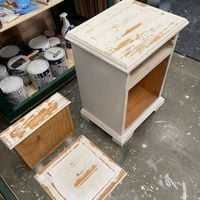
Step 3
At this stage you can either add a colour as I have done, or you can paint the whole thing and repeat the sanding exercise once it is dry.
Make sure you used a water-based or acrylic paint, rather than oil-based, as it dries much quicker and also gives a finish that is easier to sand. Leave it overnight to dry just to be safe, though.
Your painting doesn’t have to be exact as you’re going to sand it back, but I like to be neat and keep an even coat anyway.
Use a smallish brush - 38mm is perfect - and wash it out and dry after painting. Water-based or acrylic paints are easy to clean out of your brush, and once dried you can use it again for varnishing later, rather than needing another brush.
 .
.  .
. 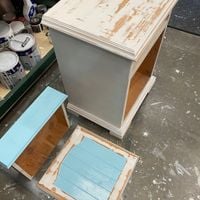
Step 4
For the next sanding stage use your 120 grit paper. The colour you have painted on will be very thin and likely sand off much quicker than the original paint on the furniture.
Take the opportunity to sand the whole piece of furniture with the 120 grit sandpaper as it will give a smooth finish.
How you mix the white, colour and wood finishes is entirely down to your tastes. I aimed for around 50% white, 30% colour and 20% wood, with patches evenly spread.
 .
. 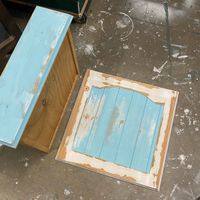
Step 5
Adding handles is such a small thing and yet really brings your piece of furniture to life. Bunnings has an amazing choice of cheap knobs to use.
For shabby chic it’s best to use either vintage-style handles or brass ones. Silver and chrome finishes don’t tend to work as well.
I wanted gold or brass to go with the pale blue and white, and the knobs I found were only $5 each.
Put the door and drawer back at this stage.
 .
.  .
.  .
. 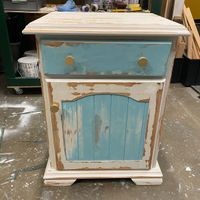
Step 6
A small touch that really adds a little extra vintage style is to line the drawers.
You can use any paper that you think fits the style, but there are small sheets of wallpaper at Bunnings for $5.20 that do the job for each drawer. I had some leftover wallpaper from another project that I could measure and cut to size.
 .
. 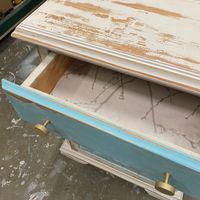
Step 7
The final step is to varnish the whole cabinet. You don’t have to do this, but it adds something extra to the vintage look. Use a small pot of ultra clear gloss. One coat should be enough, but leave overnight and add a second for an extra deep shine.
 .
.  .
.  .
. 